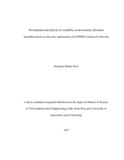Development and analysis of a mobility-aware resource allocation algorithm based on min-max optimization for OFDMA femtocell networks
Abstract
Femto Access Points (FAPs) significantly improve indoor coverage and quality of service. FAPs are small, inexpensive, low-power base stations that are generally consumer deployed. However, due to high density of FAPs, many new challenges have not been sufficiently addressed such as resources allocation and interference mitigation. In resolving resource allocation problem, user mobility dynamics make it difficult to associate the best spectrum set of frequency/time resources with each FAP in order to deliver the users’ data. The problem addressed is the determination of optimal resource allocation while user mobility dynamics are incorporated based on their position with time, while maintaining required quality of service (QoS). Prominent existing solutions which considered centralized, distributed and hybrid centralized/distributed scalable strategies are studied in literature. However, the impact of user mobility dynamics was not considered. To utilize spectrum resource more efficiently, a resource allocation mechanism that exploits the mobility of users in Orthogonal Frequency Division Multiple Access (OFDMA)-based femtocell networks known as Mobility-aware Femtocell Cluster-based Resource Allocation (M-FCRA) is presented. M-FCRA anchors upon an existing FCRA algorithm to ensure optimal resource allocation with mobility-awareness. M-FCRA has been validated by performing comparison and evaluation with FCRA algorithm. From the simulation results obtained using LTE-Sim simulator software, M-FCRA outperforms the existing state-of-the art FCRA approach in terms of Throughput Satisfaction Rate (TSR) and Spectrum Spatial Re-use (SSR). Moreover, the capacity and quality of service improvement in the network are of benefit to operators by offloading macrocell traffic hence low operating expenditures. Finally, users enjoy uninterrupted traffic indoors under mobility.

